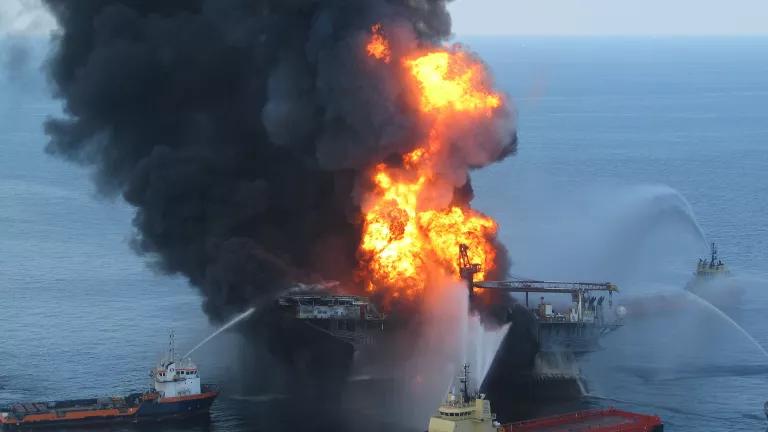New Fisheries Bill Responds to Our Ever-Changing Ocean
The Sustaining America’s Fisheries for the Future Act would reauthorize and recharge the Magnuson-Stevens Act—a promising sign for sustainable fisheries and coastal communities.

Fishing boats moored in Valdez Harbor, Alaska
The Sustaining America’s Fisheries for the Future Act would reauthorize and recharge the Magnuson-Stevens Act—a promising sign for sustainable fisheries and coastal communities.
Our prized marine fisheries will have a better shot at enduring climate change and supporting healthy marine ecosystems with a new bill introduced today by Representative Jared Huffman (CA-2) and Representative Ed Case (HI-1). The Sustaining America’s Fisheries for the Future Act would reauthorize the Magnuson-Stevens Fishery Conservation and Management Act (Magnuson-Stevens Act or MSA), our federal fisheries law, which has not been reauthorized since 2006.
The bill seeks to address the changing needs of sustainable fisheries and coastal communities. It would build on the MSA’s successes, plus recharge it to tackle challenges both old—like chronic overfishing—and new—like climate change and the havoc it is wreaking on marine ecosystems.
For more than 40 years, the MSA’s unique system of stakeholder-driven, science-based fishery management has shown us that prioritizing long-term fisheries sustainability works. But as fisheries stewards today, our job is far from complete. The most recent Status of Stocks report from NOAA fisheries showed some concerning trends for the health of U.S. fisheries. Looking at 460 federally managed fish stocks and stock complexes, the report showed a recent increase in the number of overfished stocks. Meanwhile, no stocks have been rebuilt to healthy levels in the previous year, and eight stocks have become overfished once again after being previously successful in rebuilding. (I covered this report in greater detail here.)
Despite historic successes in sustainable fisheries management, we have a lot of work to do to prevent the backsliding of fisheries conservation. Successful fisheries management in the face of climate change will require a renewed focus on sustainable catch levels and strong rebuilding measures. Other systemic challenges must also be addressed: nearly all fish stocks face habitat loss and degradation; many ecologically important species have been left poorly managed or unmanaged by any federal plan; and fisheries data systems require updating to ensure effective management and accountability.
The Sustaining America’s Fisheries for the Future Act answers the call with a robust set of reforms. It would:
- Advance climate-ready fisheries management: As our ocean warms rapidly, fish populations off our coasts are moving into cooler waters, dwindling in productivity, and facing more frequent extreme events such as marine heat waves. (Read more from NRDC about climate change’s impacts on U.S. fisheries here.) There is an urgent need for policy guidance on these issues. Title I of the Sustaining America’s Fisheries for the Future Act would respond by integrating climate considerations throughout the fisheries management process, addressing the management framework for shifting fish stocks, and jump-starting the production and use of climate-related science and data.
- Strengthen protections for important fish habitats: Title V would strengthen tools to protect essential fish habitat from the impacts of fishing gear, as well as safeguard habitat from non-fishing activities such as sand mining, dredging, and energy exploration and development. Protecting the diverse marine habitats that support fish populations is an important but underutilized element of sustainable fisheries management under the MSA. As covered in our recent detailed report, A Safety Net for Ocean Fisheries, fish habitat protections are also a key strategy for readying marine ecosystems for the effects of climate change.
- End chronic overfishing and rebuild depleted fish populations: While fishery managers and fishing communities have made significant progress in this regard, key gaps remain that have prevented managers from ensuring that all stocks recover and are maintained at healthy levels. Title V would help to ensure that rebuilding plans stay on track and put an end to chronic overfishing.
- Improve protections for other key marine species: Title V would also introduce important reforms to improve the precautionary management of forage fish, a critical food source for larger fish species and ocean wildlife, and to reduce bycatch—the unintended catch of non-target fish, marine mammals, and other wildlife.
- Support coastal communities: Fishing communities, the powerhouses of our coastal economies, are also on the frontlines of the climate crisis and global economic disruptions wrought by the pandemic. Title II of the bill would support sustainable fishing communities through a number of reforms, including a grants program for working waterfronts and updates to the fisheries disaster relief program.
Other important highlights of the bill include measures to modernize fisheries data collection and research (Title IV) and to increase accountability and transparency in the fishery management council process (Title III).

Blue rockfish swim under a kelp forest canopy in Monterey, California.
The bill follows a yearlong, nationwide “listening tour” led by Representative Huffman—who serves as chairman of the House Natural Resources Subcommittee on Water, Oceans, and Wildlife—as well as a public discussion draft, which generated robust discussion about priority policy issues currently facing our fisheries and coastal communities. The communities represented in this stakeholder-driven process included commercial fishermen, tribal members, recreational anglers and fishing guides, scientists, conservationists, seafood businesses, chefs, and local officials and fishery managers.
Through previous reauthorizations of the MSA in 1996 and 2006, Congress has consistently made progress on sustainable fisheries management, with broad bipartisan support. Representatives Huffman and Case’s Sustaining America’s Fisheries for the Future Act sets the bar for an MSA reauthorization that would build on these past gains.
This is a major step in securing a healthy and resilient future for our fisheries. We thank Representatives Huffman and Case for their commitment to sustainable fisheries and an inclusive reauthorization process, and we look forward to working with Congress to give the Magnuson-Stevens Act the updates it needs.




